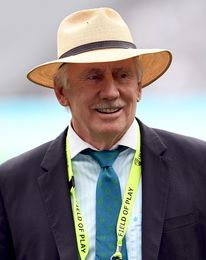One of my first stints as commentator was soon after I retired as a player. I was approached by WorldTel, the company that raised the stakes in Indian cricket from lakhs to crores of rupees by signing Sachin Tendulkar. WorldTel went on to make him one of the biggest sporting brands in the world.
So, off I went to Sri Lanka for the first time in my life. Funnily enough, I never got picked as player in the team that toured there. I checked into the hotel in Colombo, and as I opened the door to my room, I heard a voice, “Hi Sanj.” I looked behind. It was Ian Chappell. “What are you doing for lunch?” he asked. We had lunch together and after that began a long friendship and an exploration of a human being whom I find truly exceptional. My admiration for Ian Chappell grew as I got to know him more.
In that series, I was, of course, a greenhorn as a commentator. Once, while we were on air together, he teased me saying that fans in India had tried using a piece of glass to reflect sunlight into his eyes while he was playing, and asked if I was aware of this. I said, “Yes, the same thing happened to me in Australia.” He laughed heartily. I could see pride in his eyes that a young commentator had a retort and because it had become a fun moment on TV.
I have known commentators who do not like such retorts, even if it is just banter. Chappelli, as he is fondly called, is different. Ian Chappell was my mentor in commentary when I started off. There was one occasion during commentary when a batsman reached his 100, and I excitedly began to react to it. He gently put his hand on my arm, stopped me, and said, “Let him have his moment. Let us not say anything. Let the moment just play out.”
Ian Chappell, despite his legendary status as a player, became a hardcore media person after retirement. He put in the same amount of time and commitment into it as he did into playing cricket. When only his opinions on the game would be enough for any production company, Chappelli still takes the pain to know statistics. He has a special software that gives him details of all matches played all over the world. He is not just an expert on Australian cricket. Hamilton Masakadza of Zimbabwe holds as much interest for him as Steve Smith.
When I was in Australia in 1992 as player, I did a quick radio interview during a rain break. When I came out of the commentary booth, Chappelli was waiting for me. He asked me why I was not pulling the short deliveries bowled by the Australian pacemen? He suggested very animatedly that if I did that I would be able to put the Australian bowlers off their game. So here was a great Australian cricketer who wanted a player from the opposition to play better so that Australia would be challenged more. Chappelli stood for quality and not nationality when it came to world cricket.
Ian Chappell is not looking to make friends in the world. He is very choosy about who he spends time with, and once you have passed through his scanner, then you get the best of Ian Chappell. The rest have to be careful, because for them, he puts on the hard, ex-Australia captain’s hat. I have seen a few famous cricketers sneak out of the room when Chappelli enters. It is a matter of pride for me that I am not one of the people who has to do that. Get well soon, Chappelli!
Manjrekar, a former cricketer, is a commentator • editor@theweek.in


